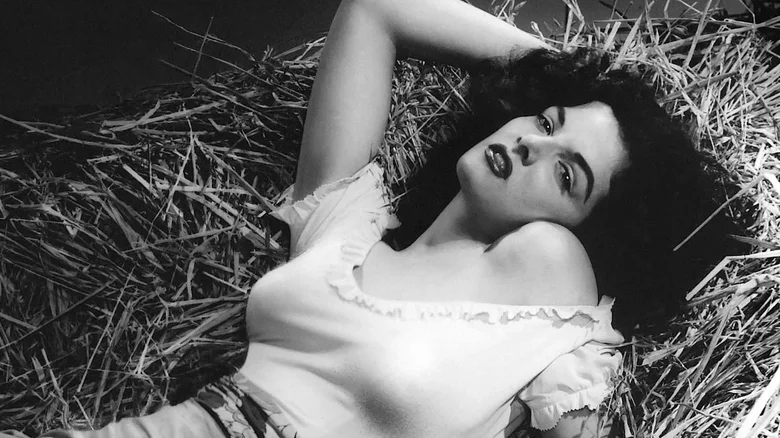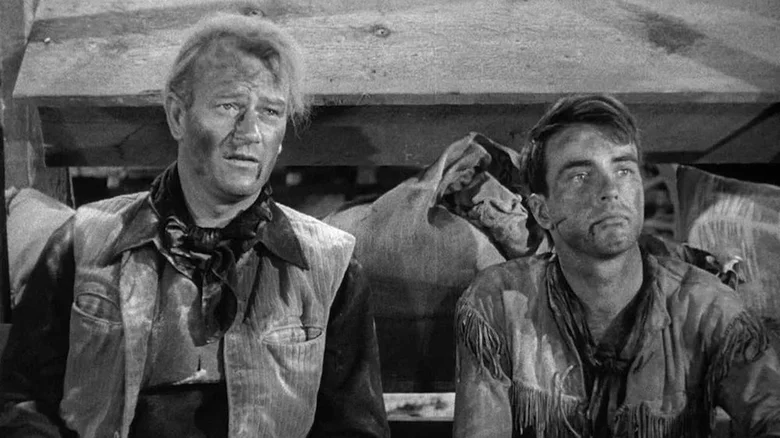John Wayne’s Red River Sparked A Feud Between Howard Hawks And Howard Hughes

Howard Hughes’s deliriously ahistorical “The Outlaw” is probably best known for star Jane Russell’s brassiere, which the director painstakingly designed to accentuate her 38DD bosom. Never mind that Russell claimed she wore it all of a few minutes, loathed the fit, and padded her own bra the old-fashioned way; the undergarment is still on display in a Hollywood museum — the, er, stuff of showbiz legend.
The film itself is an agreeably campy Western. Doc Holliday (Walter Huston) rides into Lincoln, New Mexico looking to recover his stolen horses. He tells his friend Pat Garrett (Thomas Mitchell) that Billy the Kid (Jack Buetel) is the thief, which sets up a not-terribly-understated homoerotic love triangle. It’s a goofy movie that should be a lot more fun than it is, but its script by Jules Furthman boasts some nifty flourishes, one of which finds the sharp-shooting Holliday trying to goad Billy into a duel by grazing him with bullets.
If you’ve seen Howard Hawks’ “Red River,” this should sound familiar. It certainly did to Hughes, who’d either fired Hawks from directing “The Outlaw” or frustrated the filmmaker so thoroughly that he quit. Either way, when Hughes caught wind that Hawks had concluded his then-unreleased Western with a scene wherein John Wayne fires a series of shots at Montgomery Clift in an attempt to drive his charge-turned-rival to violence, he threatened to sue if the sequence wasn’t removed from the final cut. With the release of “Red River” less than a month away, a compromise needed to be reached in short order.
Hawks v. Hughes

United Artists
Hughes’ attorney Lloyd Wright contacted Edward Small, a major investor in “Red River,” to arrange a screening of the disputed footage for the eccentric industrialist. Sure enough, Hughes dug in on his objections, and threatened an injunction that would delay the film’s planned September 1, 1948 release indefinitely.
Small, who’d worked with Hughes before, knew the businessman wouldn’t back down until he got his way, so he arranged a showdown of sorts between the contentious parties. Hughes and Hawks met at one of the former’s aircraft plants in Inglewood, California. According to Scott Eyman’s “John Wayne: The Life and Legend,” the two fought bitterly over a potential remedy. This forced Small to play to Hughes’ vanity:
“‘Both men were tall and lean, and I felt like the referee between two animated redwood trees,’ remembered Small. Finally, Small suggested that Hughes edit the sequence to suggest what Hawks, Feldman, and Small should do. Hughes made a few cuts, eliminating about twenty-four seconds, including a shot where Dunson’s bullet creases Matt’s cheek. Also removed were nine words of Wayne’s dialogue: ‘Draw. Go on, draw. Well, then, I’ll make you.’ As Small realized, ‘If I had made the same infinitesimal alterations, he probably wouldn’t have accepted them.'”
A quick fix to an enduring classic

United Artists
In 2022, these fixes could be implemented in-house overnight, with new DCPs rushed to multiplexes within days. In 1948, editing teams had to fly to the Southwest (where Wayne’s movies tended to premiere) and splice the recut footage into the already struck prints. They got the job done, and “Red River” debuted on time. The film went on to triple its budget at the U.S. box office, and earn Academy Award nominations for Best Motion Picture Story and Best Editing.
74 years after its release, “Red River” is recognized as one of the finest Westerns ever made. John Wayne gives one of his very best performances as the conflicted Dunson; upon seeing his longtime collaborator in the film, John Ford exclaimed, “I never knew the big son of a bi*** could act!” Wayne is every bit as unsympathetic here as we would be years later in Ford’s “The Searchers,” but Hawks and Furthman state the case for his character’s bigoted obsolescence more plainly. He operates outside the law to maintain his empire. He is a murderer. Westward expansion might be a fait accompli, but the country will collapse if men of his tyrannical ilk seize the reins of these new territories.
Like Hughes and Hawks, America struck a tenuous compromise, one that has been renegotiated for well over a century. It is disconcerting to see Dunson’s type rise again.





